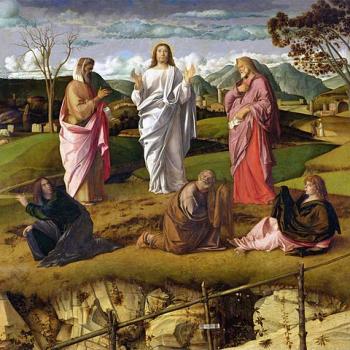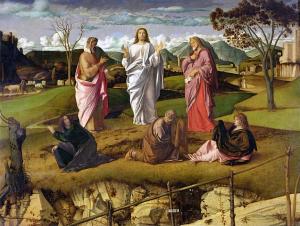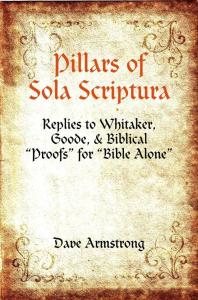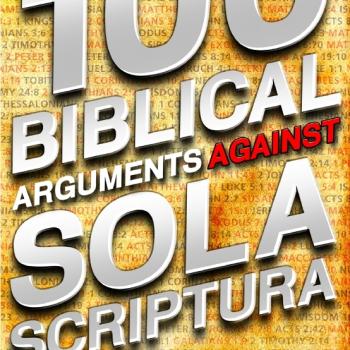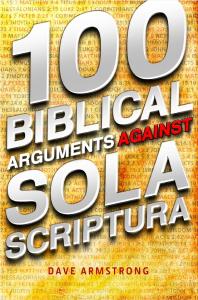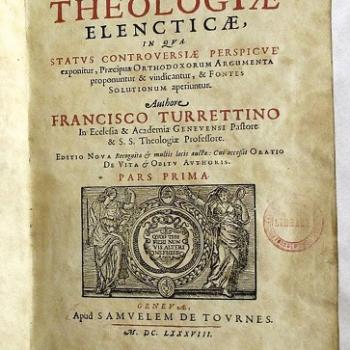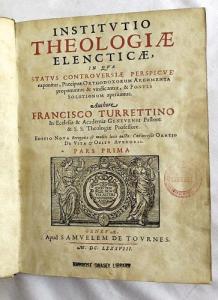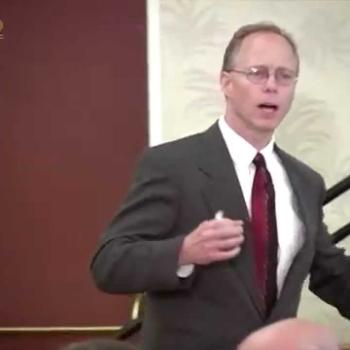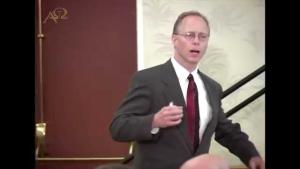Including St. Athanasius’ Rule of Faith & the Indefectibility of the OT “Proto-Church”

“Please Hit ‘Subscribe’”! If you have received benefit from this or any of my other 4,600+ articles, please follow this blog by signing up (with your email address) on the sidebar to the right (you may have to scroll down a bit), above where there is an icon bar, “Sign Me Up!”: to receive notice when I post a new blog article. This is the equivalent of subscribing to a YouTube channel. Please also consider following me on Twitter / X and purchasing one or more of my 55 books. All of this helps me get more exposure, and (however little!) more income for my full-time apologetics work. Thanks so much and happy reading!
***
The debate was entitled, “Is the Bible the Only Infallible Rule of Faith?” and it occurred on July 23, 1996. White described it as “The single most lively and revealing debate on Sola Scriptura yet. . . . in Fullerton, CA, in front of a large, highly partisan (RC) audience . . . proves clearly that the Roman Catholic believes in Sola ecclesia, (the Church Alone).” Listen to the debate on White’s blog or on YouTube.
I will be responding to one of White’s typically arrogant, boorish, and obnoxious post mortem analyses of his own debate: “An Open Letter to Tim Staples” (11-19-96). Bishop / “Dr.” [???] White — by the way — has always made a big deal of his debate opponents not (in some cases) publishing their debates with him (since he thinks this suggests a lack of confidence of having prevailed). So, for example, he wrote:
I have seen my opponents use many tactics to cover over poor performances in debates. . . . But never before have we seen such complete and utter admission of defeat than we are seeing from St. Joseph Communications regarding the July debate with Tim Staples on Papal Infallibility in Fullerton, California . . . amazingly, we have learned that Saint Joseph’s is still not selling the audio tapes of the debate, and that more than two months after the encounter. We have been making the tapes available since the week after the debate. We made it available as soon as we possibly could. (“Saint Joseph Communications Admits Defeat“)
I debated James White by means of typewritten letters in March-May 1995. The complete transcript of that has been on my website from its beginning, in February 1997. It has never been posted on his website. I would guess that’s because he split, leaving my last 36-page (single-spaced) reply completely unanswered. So his performance certainly left a lot to be desired, by virtue of that fact alone — if nothing else.
Also, the transcript of our only “live” (chat) debate — on the Blessed Virgin Mary —, from 29 December 2000, has been posted on my site ever since it occurred, and has never appeared on his. He left that one early, too (citing technical problems). I added footnotes to it (which he highly objected to, for some unknown reason). Then I later analyzed his relentless techniques of sophistry in the exchange. Both also appear in my book, Debating James White: Shocking Failures of the “Undefeatable” Anti-Catholic Champion (Nov. 2013, 395 pages; read the introduction): which, of course, White has utterly ignored, too (what a shock!) for now over ten years.
White’s words will be in blue.
*****
11/19/96
TO: Tim Staples, St. Joseph Catholic Radio
FROM: James White, Alpha and Omega Ministries
RE: The Debate in Review: An Open Letter to Tim Staples
. . . I was much less excited, however, by a number of things that detracted a good bit from the debate, at least from a professional viewpoint. While the moderator took great pains to be fair, you took advantage of him many times, and went over your time limit again and again and again. I have found this a common thing amongst Roman Catholic apologists: . . . I hope in the future you will show more respect for your opponent, and the audience, by paying attention to that issue.
I have found it common amongst almost everyone who does debates. Now, maybe Bishop White’s behavior is, without exception impeccable in this regard, and maybe Tim did do some of this. I don’t know. But the sweeping generalization of Catholic apologists (as if — it’s insinuated — Protestant ones never exhibit this fault) just doesn’t fly. Nice try.
On a personal level, I was quite simply shocked at the amount of ad-hominem argumentation you utilized in our debate.
Yes, he always is, even though he has lobbed 37 trillion insults at Catholics en masse, and Catholic apologists (see some of his more fun, notable, and colorful insults, sent my way) for over thirty years. White complaining about insults is sort of like a fish complaining that it is in water.
Of course, I find such tactics indicative of a lost cause, . . .
Yeah, me, too. And I’ve always pointed out — including scores of times with White himself — that this is why they are used.
I also get the feeling that you were doing what you had been instructed to do by folks like Patrick Madrid, who likewise uses the “insult, deprecate, and impugn your opponent” means of debating. I had honestly hoped for something better.
If White has to stoop to the level of making this ridiculous claim about Patrick Madrid — of all people –: one of the most courteous, gentle, level-headed, easy-going apologists of any stripe (and a great role model for all of us in that respect), it shows how truly desperate he is to broad-brush.
Throughout the debate you accused me of misrepresentation, out-of-context citation, and toward the end, direct “misquoting” of Augustine and Athanasius. Sadly, you never proved those accusations, nor, as we both know, could you.
This is an utterly plausible claim to me, as one who has dealt with White over the past 29 years. I’ve seen it myself, times without number. And if he gets specific about Church fathers in this open letter, I will prove it.
I saw what resources you had, and you did not have the original contexts of any of the citations I gave.
Those are easy enough to get, especially if they are online, as most are these days.
I saw your list of short quotes from the Fathers-it was all you had with you.
I had no notes whatever in my live chat debate on Mary with White, because it was spontaneous and unplanned, after Reformed apologist Tim Enloe (now retired from debates with Catholics) prematurely departed our own live chat debate in White’s chat room. Even so, once White didn’t have quick pat answers, he got out of there as soon as he could.
I, on the other hand, had the entire Eerdman’s set on my hard-drive, the volume of Athanasius sitting on my desk, . . .
That’s all online now. We can easily and quickly check out-of-context quotes form anti-Catholics.
I’m sure your followers will accept your claims without question, and will never bother to look up what Athanasius actually said.
I’m equally sure that Bishop White’s followers will accept his claims without question, too, and will never bother to look up what Athanasius actually said. This is not a trait unique to Catholic listeners of debate, either. 95% of each side automatically thinks that their guy “won.”
However, what of those who are not your followers, Tim? What of the person who is simply seeking the truth?
That works both ways.
You see, the fair and scholarly thing to say would be, “I believe you are misrepresenting Athanasius’ entire doctrine of authority and tradition, and here is a citation that supports my assertion.” But, of course, your citation didn’t provide that kind of basis,
I’ll take White’s word for that. But I certainly have done exactly this (beginning almost 21 years ago):
St. Athanasius’ Rule of Faith (NOT Sola Scriptura) [6-16-03] [includes lengthy citations of St. John Henry Cardinal Newman about St. Athanasius’ rule of faith, from his Select Treatises of St. Athanasius, Volume II, 1844 (his Anglican period) ]
Did Athanasius Accept Sola Scriptura? (vs. Bruno Lima) [10-14-22]
If White is pretending that St. Athanasius believed in sola Scriptura, he is lying, pure and simple, and deceiving his audience. He knows too much to simply be incompetent.
I cited from Athanasius’ letter to Serapion in that article, and provided a strong passage indicating his assertion of the self-sufficiency of Scripture,
Self-sufficiency in this context (a debate on the rule of faith) means the formal sufficiency of Scripture, which means that the Bible is sufficient in and of itself to function as the rule of faith, without the addition of an infallible Church and/or infallible tradition. White, elsewhere, stated this himself:
The doctrine of sola scriptura, simply stated, is that the Scriptures alone are sufficient to function as the regula fidei, the infallible rule of faith for the Church. (The Roman Catholic Controversy, Minneapolis: Bethany House Publishers, 1996, 59)
But Athanasius affirmed infallible Church and conciliar pronouncements, the Catholic rule of faith, and the binding, infallible nature of doctrines received through apostolic succession and apostolic tradition (all expressly contrary to sola Scriptura):
The confession arrived at at Nicæa was, we say once more, sufficient and enough by itself, for the subversion of all irreligious heresy, and for the security and furtherance of the doctrine of the Church. (Ad Afros Epistola Synodica 1)
But the word of the Lord which came through the ecumenical Synod at Nicea, abides forever. (Ad Afros Epistola Synodica 2; in NPNF2, IV:489)
For that of Nicæa is sufficient, agreeing as it does with the ancient bishops also, . . . the testimony of the ancient bishops, . . . (Ad Afros Epistola Synodica 9)
But let the Faith confessed by the Fathers at Nicæa alone hold good among you, . . . in order that of us too the Apostle may say, ‘Now I praise you that you remember me in all things, and as I handed the traditions to you, so hold them fast 1 Corinthians 11:2.’ (Ad Afros Epistola Synodica 10)
For had they believed aright, they would have been satisfied with the confession put forth at Nicæa by the whole Ecumenical Council; . . . they dare to question those sound definitions of the faith, and take upon themselves to produce others contrary to them, . . . (Ad Episcopos Aegypti et Libyae, 5)
Who will not denounce their audacity, that being but few in number, they . . . would forcibly cancel the decrees of an uncorrupt, pure, and Ecumenical Council? (Ad Episcopos Aegypti et Libyae, 7)
It is enough merely to answer such things as follows: we are content with the fact that this is not the teaching of the Catholic Church, nor did the fathers hold this. (Letter No. 59 to Epictetus, 3)
What defect of teaching was there for religious truth in the Catholic Church . . .? (De Synodis, I, 3)
But ye are blessed, who by faith are in the Church, dwell upon the foundations of the faith, and have full satisfaction, even the highest degree of faith which remains among you unshaken. For it has come down to you from Apostolic tradition, . . . (Fragment from Letter No. 29 [Migne, xxvi, p. 1189] )
J. N. D. Kelly, the Anglican patristic scholar, wrote about Athanasius’ views:
Athanasius, disputing with the Arians, claimed that his own doctrine had been handed down from father to father, whereas they could not produce a single respectable witness to theirs. . . . [T]he ancient idea that the Church alone, in virtue of being the home of the Spirit and having preserved the authentic apostolic testimony in her rule of faith, liturgical action and general witness, possesses the indispensable key to Scripture, continued to operate as powerfully as in the days of Irenaeus and Tertullian . . . Athanasius himself, after dwelling on the entire adequacy of Scripture, went on to emphasize the desirability of having sound teachers to expound it. Against the Arians he flung the charge that they would never have made shipwreck of the faith had they held fast as a sheet-anchor to the . . . Church’s peculiar and traditionally handed down grasp of the purport of revelation. (Early Christian Doctrines, San Francisco: HarperCollins, revised edition, 1978, 45, 47)
I quoted four passages from Athanasius. I here provide you not only with the passages themselves, but with the immediate context, in Greek, of each one. I look forward to the demonstration on your part, Tim, of how any of these passages is “out of context.”
I now provide the four, best as I can make them out, since White gave the Greek texts, not the English ones:
Let this, then, Christ-loving man, be our offering to you, just for a rudimentary sketch and outline, in a short compass, of the faith of Christ and of His Divine appearing to usward. But you, taking occasion by this, if you light upon the text of the Scriptures, by genuinely applying your mind to them, will learn from them more completely and clearly the exact detail of what we have said. 2. For they were spoken and written by God, through men who spoke of God. But we impart of what we have learned from inspired teachers who have been conversant with them, who have also become martyrs for the deity of Christ, to your zeal for learning, in turn. (On the Incarnation of the Word, 56, 1-2)
It’s not out-of-context so much as it is a non sequitur (irrelevant to the debate), which it is because Catholics and Protestants wholly agree on the unique inspired nature of Holy Scripture: God’s revelation to us. That’s not at issue. A Catholic has no issue whatsoever with the above statement. It’s completely harmonious with our view. The issue in dispute in this debate is not the nature of Holy Scripture; rather, it’s the rule of faith: that is, whether any given Church father thought there were infallible authorities in Christianity apart from Holy Scripture, and whether the Bible is formally sufficient as the rule of faith.
Athanasius — as I have already proven from his own writings — clearly agrees with the Catholic position, not the Protestant one. White has simply selected portions of Athanasius that might (prima facie) be thought to support his view (sola Scriptura), but in fact do not do so at all. And he ignores the quotations such as what I have produced (it’s the old, tired standard anti-Catholic methodology of pick-and-choose and highly selective, “half-truth” presentation).
. . . the tokens of truth are more exact as drawn from Scripture, than from other sources . . . (De Decretis, 32)
No problem for Catholics at all . . . De Decretis is a defense of the Council of Nicaea (325). I’ve already provided, above, six citations from Athanasius, detailing what he thought of that council. It was “sufficient and enough by itself, for the subversion of all irreligious heresy,” and set forth “the word of the Lord” so sufficiently that it “abides forever.” It was “an uncorrupt, pure, and Ecumenical Council.” That’s an infallible council, folks: contrary to sola Scriptura, and Luther’s proclamation of erring councils at the Diet of Worms. This isn’t rocket science. It’s rather straightforward. St. Athanasius also wrote about the Nicene Council in this treatise:
Are they not then committing a crime, in their very thought to gainsay so great and ecumenical a Council? (4)
. . . let them not utter complaints against so great a Council. (5)
. . . the definition of the Council against them, if accurately examined, will be found to be altogether a representation of the truth, . . . (18)
. . . surely the Council was sound in its doctrine and correct in its decree. (23)
See, we are proving that this view has been transmitted from father to father; but you, O modern Jews and disciples of Caiaphas, how many fathers can you assign to your phrases? Not one of the understanding and wise; for all abhor you, but the devil alone; none but he is your father in this apostasy, who both in the beginning sowed you with the seed of this irreligion, and now persuades you to slander the Ecumenical Council , for committing to writing, not your doctrines, but that which from the beginning those who were eye-witnesses and ministers of the Word have handed down to us. For the faith which the Council has confessed in writing, that is the faith of the Catholic Church; to assert this, the blessed Fathers so expressed themselves while condemning the Arian heresy; and this is a chief reason why these apply themselves to calumniate the Council. (27)
White’s third citation is Ad Episcopus Aegypti et Libyae, which uses the word Scripture[s] 35 times. I cited the same document twice (where Athanasius referred to the Nicene Council). All things have to be considered together. That’s what fair scholarship and research method attempts to do, and what White apparently didn’t do in one of his articles that he refers to in this open letter.
1. The knowledge of our religion and of the truth of things is independently manifest rather than in need of human teachers, for almost day by day it asserts itself by facts, and manifests itself brighter than the sun by the doctrine of Christ. 2. Still, as you nevertheless desire to hear about it, Macarius , come let us as we may be able set forth a few points of the faith of Christ: able though you are to find it out from the divine oracles, but yet generously desiring to hear from others as well. 3. For although the sacred and inspired Scriptures are sufficient to declare the truth — while there are other works of our blessed teachers compiled for this purpose, if he meet with which a man will gain some knowledge of the interpretation of the Scriptures, and be able to learn what he wishes to know — still, as we have not at present in our hands the compositions of our teachers, we must communicate in writing to you what we learned from them — the faith, namely, of Christ the Saviour; lest any should hold cheap the doctrine taught among us, or think faith. in Christ unreasonable. For this is what the Gentiles traduce and scoff at, and laugh loudly at us, insisting on the one fact of the Cross of Christ; and it is just here that one must pity their want of sense, because when they traduce the Cross of Christ they do not see that its power has filled all the world, and that by it the effects of the knowledge of God are made manifest to all. (Against the Heathen, 1-3)
See my above comments about the unsavory nature of this selective methodology. In the same work, Athanasius also writes:
But the sectaries, who have fallen away from the teaching of the Church, and made shipwreck concerning the Faith [1 Timothy 1:19], they also wrongly think that evil has a substantive existence. But they arbitrarily imagine another god besides the true One, the Father of our Lord Jesus Christ, and that he is the unmade producer of evil and the head of wickedness, who is also artificer of Creation. But these men one can easily refute, not only from the divine Scriptures, but also from the human understanding itself, the very source of these their insane imaginations. (6:3)
This conceit of theirs, then, being evidently rotten, the truth of the Church’s theology must be manifest: . . . (7:3)
But that the soul is made immortal is a further point in the Church’s teaching which you must know, . . . (33:1)
The word truth appears 32 times in this work. A few times it is directly connected to the Bible, but most times, not. In other words, he’s not contending that the Bible is the only source of truth. It can be obtained in other ways, too.
I also note, Mr. Staples, your citation of Basil . . . I shouldn’t be surprised: This Rock cited the same passage (I’m sure Patrick [Madrid] was behind that, too), . . . How good it would have been, Tim, had you taken the high road and attempted a meaningful critique of my own citation of this entire passage as it is found in my chapter in the book on sola scriptura-how much more meaningful that would have been! I would truly have been impressed by someone who would have attempted to deal with my citation of Jurgens’ own words with reference to “things written and things not written” (p. 38, footnote 17).
Be that as it may, St. Basil the Great didn’t believe in sola Scriptura any more than Athanasius did, as I have written about five times through the years
Basil the Great (d. 379) vs. Sola Scriptura as the Rule of Faith [8-1-03]
David T. King and William Webster: Out-of-Context or Hyper-Selective Quotations from the Church Fathers on Christian Authority: Part II: St. Basil the Great [11-11-13]
Vs. James White #16: St. Basil Held to Sola Scriptura? [11-19-19]
Self-Interpreting Bible & Protestant Chaos (vs. Turretin): Including Documentation that St. Basil the Great — Contrary to Turretin’s Claim — Did Not Believe in Sola Scriptura [8-29-22]
Church Fathers & Sola Scriptura: Reply To James White Claims: Myths Regarding Cyprian, Augustine, Basil the Great, John Chrysostom, Cyril of Jerusalem, Athanasius [3-16-24]
Have you ever considered why you have such a vested interest in turning the Scriptures into a “dead letter” rather than a living one? Is it not because you believe in sola ecclesia, and hence must adopt this stance?
Plain stupid and silly . . .
Also, with reference to your statement, which truly caught me by surprise, that despite the losing of the Scriptures and their discovery under Josiah, “The Church went right along without the Scriptures,” I must admit I have to wonder what you were talking about. Do you not recall that the people were wandering in darkness, violating God’s laws, and that they endured His wrath as a result? The “oral traditions” and “magisterium” of the day failed to lead the people aright. The “Church” did not “go along” without the Scriptures: she stumbled right into the pit of wrath, in point of fact.
The Old Testament is a sad record of the continual forsaking of the Lord by the Israelites, but also their (God-caused) revivals and return. The question here — which I think Tim was likely emphasizing — is whether the OT “proto-church” ever completely died (just as White thinks the Catholic Church did). St. Francis de Sales, in his book, The Catholic Controversy, makes some solid arguments that this did not happen (my bracketed interjections):
Exodus 32:26 [RSV] then Moses stood in the gate of the camp, and said, “Who is on the LORD’s side? Come to me.” And all the sons of Levi gathered themselves together to him.
Did not Aaron the High Priest adore the golden calf with all his people? [Protestant argument for complete defectibility] Answer: Aaron was not as yet High Priest, nor head of the people, but became so afterwards. And it is not true that all the people worshipped idols: — for were not the children of Levi men of God, who joined themselves to Moses? (pp. 60-61)
2 Chronicles 15:3 For a long time Israel was without the true God, and without a teaching priest, and without law;
Elijah lamented that he was alone in Israel (1 Ki 19:14) [“I, even I only, am left”]. Answer: Elijah was not the only good man in Israel, for there were seven thousand men who had not given themselves up to idolatry [1 Ki 19:18: “I will leave seven thousand in Israel, all the knees that have not bowed to Ba’al”], and what the Prophet says here is only to express better the justice of his complaint. It is not true again that if all Israel had failed, the Church would have thereby ceased to exist, for Israel was not the whole Church. Indeed it was already separated therefrom by the schism of Jeroboam; and the kingdom of Judah was the better and principal part; and it is Israel, not Judah, of which Azarias predicted that it should be without priest and sacrifice. (p. 61)
Isaiah 1:4-6 Ah, sinful nation, a people laden with iniquity, offspring of evildoers, sons who deal corruptly! They have forsaken the LORD, they have despised the Holy One of Israel, they are utterly estranged. [5] Why will you still be smitten, that you continue to rebel? The whole head is sick, and the whole heart faint. [6] From the sole of the foot even to the head, there is no soundness in it, . . .
. . . these are forms of speaking, and of vehemently detesting the vice of a people. And although the Prophets, pastors and preachers use these general modes of expression, we are not to understand them of each particular person, but only of a large proportion; as appears by the example of Elijah who complained that he was alone, notwithstanding that there were yet seven thousand faithful. [1 Ki 19:14, 18] S. Paul complains to the Philippians (2:21) that all seek their own interest and advantage; still at the end of the Epistle he acknowledges that there were many good people with him and with them. [4:10, 14-18] (p. 61)
Psalm 14:2-3 The LORD looks down from heaven upon the children of men, to see if there are any that act wisely, that seek after God. [3] They have all gone astray, they are all alike corrupt; there is none that does good, no, not one. [cf. Ps 53:1-3; 143:2; Is 64:6-7; Rom 3:10-12]
Who knows not the complaint of David . . . — and who knows not on the other hand that there were many good people in his day? [see Ps 7:10; 11:2, 5, 7; 15:2-5; 18:23, 25-26; 24:4; 31:18; 32:11; 33:1; 34:17, 21; 36:10; 37:14, 16, 18, 21, 25, 28-32, 37, 39; 52:6; 55:22; 58:10-11; 64:4, 10; 68:3; 73:1; 75:10; 84:11; 92:12; 94:15; 97:11; 101:6; 107:42; 111:1; 112:2, 4-9; 118:20; 119:1, 10; 125:3-4; 140:13; 141:5; 142:7: “upright,” “good,” “righteous,” “blameless,” “pure”] These forms of speech are frequent, but we must not draw a particular conclusion about each individual. Further, — such things do not prove that faith had failed in the Church, nor that the Church was dead: for it does not follow that if a body is everywhere diseased it is therefore dead. Thus, without doubt, are to be understood all similar things which are found in the threats and rebukes of the Prophets. (pp. 61-62)
Likewise, Isaiah states: “all our righteous deeds are like a polluted garment . . . There is no one that calls upon thy name,” (Is 64:6-7), yet makes frequent reference to the righteous (that word, or righteousness, appears 56 times in the book, in RSV) just as in the Psalms (1:17; 3:10; 26:7; 33:15; 38:3; 51:7; 56:1; 57:1-2, 12; 64:5). Isaiah 64:6-7 is typical Hebrew hyperbole. But Protestants, and especially Calvinists with their unbiblical notion of total depravity (not understanding the literary genre) interpret it and similar passages literally. In context, clearly it is not intended to be so. In the passage immediately before (Is 64:5), the prophet states: “Thou meetest him that joyfully works righteousness.”
Therefore, White’s claim of “OT defectibility”: is not at all unquestionable. It has to be seriously argued, with all of the relevant biblical data taken into account. White is the “master” of the selective Bible citation and corresponding argument based on this sort of half-truth.
I might note as well, Tim, that when you spent half of your closing statement discussing Papal infallibility, you made a few statements that were way out of line. First, you discussed Vigilius, when I never mentioned him.
White didn’t have to mention him for it to be relevant, if it is related to the topic. Where did White get this silly notion? Would he claim that he has never mentioned in his umpteen debates anything that his opponent didn’t mention first? It’s asinine. Vigilius clearly is relevant to the topic of papal infallibility, since his case is an objection to it that critics of the Catholic Church often bring up. But it’s a failed objection. See:
Pope Vigilius (Catholic Encyclopedia)
Was Pope Vigilius a Heretic? (Mark Hausam, Where Peter Is, 4-12-20)
Popes Vigilius and Honorius I (David J. Pollard, Worldwide Catholic Solidarity, 2-7-14)
But please keep this one thing in mind: I do not debate for “my side.” I realize that there will be “X” number of people at a debate who will agree with me, and there will be “Y” number of people who will agree with my opponent. Those folks are going to sit there and listen, and hopefully be blessed, but their minds are already made up. I debate for the person who is truly seeking answers-the best possible answers. I seek to convince the person who is going to check out everything I say, and critically analyze my arguments.
This is true, and my goal as well in my many written debates. Nice to end on a note of agreement!
*
***
*
Practical Matters: Perhaps some of my 4,600+ free online articles (the most comprehensive “one-stop” Catholic apologetics site) or fifty-five books have helped you (by God’s grace) to decide to become Catholic or to return to the Church, or better understand some doctrines and why we believe them.
Or you may believe my work is worthy to support for the purpose of apologetics and evangelism in general. If so, please seriously consider a much-needed financial contribution. I’m always in need of more funds: especially monthly support. “The laborer is worthy of his wages” (1 Tim 5:18, NKJV). 1 December 2021 was my 20th anniversary as a full-time Catholic apologist, and February 2022 marked the 25th anniversary of my blog.
PayPal donations are the easiest: just send to my email address: [email protected]. Here’s also a second page to get to PayPal. You’ll see the term “Catholic Used Book Service”, which is my old side-business. To learn about the different methods of contributing (including Zelle), see my page: About Catholic Apologist Dave Armstrong / Donation Information. Thanks a million from the bottom of my heart!
*
***
Summary: I offer critical analysis of Baptist anti-Catholic James White’s post mortem of his 1996 debate with Catholic apologist Tim Staples on the subject of the rule of faith.






